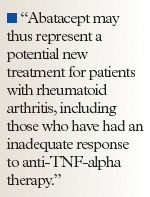- Safety & Recalls
- Regulatory Updates
- Drug Coverage
- COPD
- Cardiovascular
- Obstetrics-Gynecology & Women's Health
- Ophthalmology
- Clinical Pharmacology
- Pediatrics
- Urology
- Pharmacy
- Idiopathic Pulmonary Fibrosis
- Diabetes and Endocrinology
- Allergy, Immunology, and ENT
- Musculoskeletal/Rheumatology
- Respiratory
- Psychiatry and Behavioral Health
- Dermatology
- Oncology
Abatacept demonstrates efficacy in place of TNF-alpha inhibitors
Rheumatoid arthritis patients, hindered by an inadequate response to tumor necrosis factor-alpha (TNF-alpha) inhibitors, may find some relief in the form of a drug that belongs to a new class of selective costimulation modulators.
Rheumatoid arthritis patients, hindered by an inadequate response to tumor necrosis factor-alpha (TNF-alpha) inhibitors, may find some relief in the form of a drug that belongs to a new class of selective costimulation modulators.

"Our data suggests that, in addition to playing a key role in the activation of naïve T-cells that orchestrate early disease, costimulation continues to play a role in the pathogenesis of established, long-standing disease," the authors, led by Mark C. Genovese, concluded in the New England Journal of Medicine (NEJM). "Abatacept may thus represent a potential new treatment for patients with rheumatoid arthritis, including those who have had an inadequate response to anti-TNF-alpha therapy."
This led Genovese and colleagues to initiate the Abatacept Trial in Treatment of Anti-TNF Inadequate Responders (ATTAIN).
The trial consisted of patients with active rheumatoid arthritis and an inadequate response to anti-TNF-alpha therapy (etanercept or infliximab). From December 10, 2002, to June 2, 2004, each was randomly assigned in a 2:1 ratio to receive abatacept or placebo on Days 1, 15, and 29 and every 28 days thereafter for 6 months, in addition to at least 1 disease-modifying antirheumatic drug. Patients discontinued anti-TNF-alpha therapy before randomization.
A total of 322 patients completed the 24 weeks of therapy: 223 (86.4%) in the abatacept group and 99 (74.4%) in the placebo group. Lack of efficacy was the primary reason for discontinuation in both groups (5.4% and 20.3%, respectively).
The rates of American College of Rheumatology (ACR 20) responses, indicating a clinical improvement of 20% or greater, and improvement in functional disability, as reflected by scores for the Health Assessment Questionnaire (HAQ) disability index, were assessed.
After 6 months, the rates of ACR 20 responses were 50.4% in the abatacept group and 19.5% in the placebo group (P<.001). The respective rates of ACR 50 and ACR 70 responses also were significantly higher in the abatacept group than in the placebo group: 20.3% versus 3.8%, P<.001; and 10.2% versus 1.5%, P=.003.
At 6 months, significantly more patients in the abatacept group than in the placebo group had a clinically meaningful improvement in physical function, as reflected by an improvement from baseline of at least 0.3 in the HAQ disability index (47.3% vs 23.3%, P<.001).
In addition, the efficacy of abatacept was similar regardless of whether patients were receiving anti-TNF-alpha therapy at the time of screening or had a history of such therapy.
The incidence of adverse events and peri-infusional adverse events was 79.5% and 5.0%, respectively, in the abatacept group and 71.4% and 3.0%, respectively, in the placebo group. The incidence of serious infections was 2.3% in each group.
"The incidence of infection was slightly higher in the abatacept group than in the placebo group, but no specific infection was clearly more frequent, and the intensity of infections appeared similar in the 2 groups," the authors stated.
Antibodies against abatacept developed in only 3 of 234 patients (1.3%).
SOURCE Genovese MC, Becker J-C, Schiff M, et al. Abatacept for rheumatoid arthritis refractory to tumor necrosis factor inhibition. N Engl J Med. 2005;353:1114–1123.
